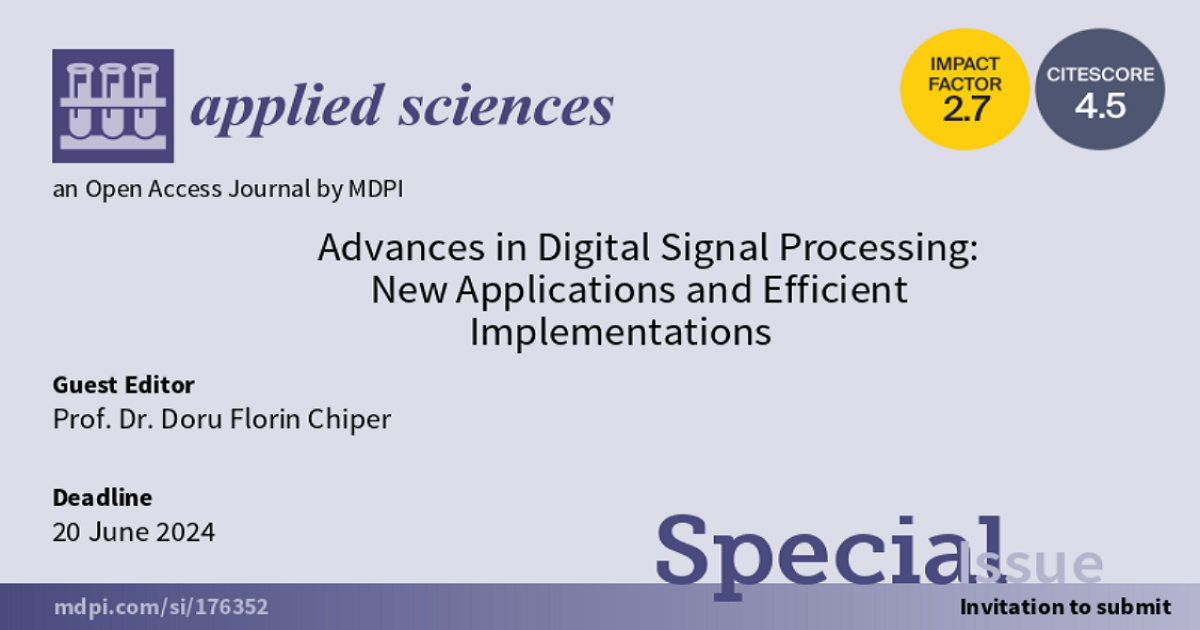Advances in Digital Signal Processing: New Applications and Efficient Implementations
A special issue of Applied Sciences (ISSN 2076-3417). This special issue belongs to the section "Computing and Artificial Intelligence".
Deadline for manuscript submissions: 20 June 2024 | Viewed by 295

Special Issue Editor
Interests: digital signal processing (DSP); adaptive signal processing; blind equalization/identification; fast computational algorithms; parallel and VLSI algorithms and architectures for communications and DSP; high-level DSP design
Special Issues, Collections and Topics in MDPI journals
Special Issue Information
Dear Colleagues,
In the new era of digital revolution, new advanced DSP applications have appeared. The advances in modern DSP applications, such as multimedia, big data, IoT, etc., have increased the importance of the optimization and efficient implementation of DSP algorithms and architectures, both for a VLSI or a software VLSI implementation. We can say that they represent an essential part of the research in such modern applications.
For real time implementations of such modern DSP applications, an efficient optimization of such algorithms and architectures for an efficient VLSI implementation are often a critical and challenging issue. For example, real-time multimedia applications have increasingly greater performance requirements due to data processing and transmission of huge data volumes at high speeds, with resource constraints specific to portable devices.
This Special Issue focuses on papers that demonstrate how these design challenges can be overcome using innovative solutions.
Topics of interest for this Special Issue include but are not limited to:
- VLSI signal processing;
- Signal processing methods for an efficient implementation;
- Optimization of the VLSI implementation of multimedia blocks;
- Low-power circuits and systems for DSP applications;
- Efficient adaptive/learning algorithms (low complexity/fast versions, optimized parameters, etc.);
- Tensor-based signal processing (efficient decomposition methods, low-rank approximations, etc.);
- Sparsity-aware algorithms.
Prof. Dr. Doru Florin Chiper
Guest Editor
Manuscript Submission Information
Manuscripts should be submitted online at www.mdpi.com by registering and logging in to this website. Once you are registered, click here to go to the submission form. Manuscripts can be submitted until the deadline. All submissions that pass pre-check are peer-reviewed. Accepted papers will be published continuously in the journal (as soon as accepted) and will be listed together on the special issue website. Research articles, review articles as well as short communications are invited. For planned papers, a title and short abstract (about 100 words) can be sent to the Editorial Office for announcement on this website.
Submitted manuscripts should not have been published previously, nor be under consideration for publication elsewhere (except conference proceedings papers). All manuscripts are thoroughly refereed through a single-blind peer-review process. A guide for authors and other relevant information for submission of manuscripts is available on the Instructions for Authors page. Applied Sciences is an international peer-reviewed open access semimonthly journal published by MDPI.
Please visit the Instructions for Authors page before submitting a manuscript. The Article Processing Charge (APC) for publication in this open access journal is 2400 CHF (Swiss Francs). Submitted papers should be well formatted and use good English. Authors may use MDPI's English editing service prior to publication or during author revisions.
Keywords
- VLSI signal processing
- signal processing methods
- efficient implementation
- multimedia blocks
- low power circuits and systems
- efficient adaptive algorithms
- learning algorithms
- efficient decomposition methods
- low-rank approximations
- sparsity exploitation





